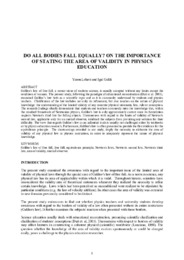Do all bodies fall equally? On the importance of stating the area of validity in physics education
Abstract
Galileo's law of free fall, a corner stone of modern science, is usually accepted without any limits except the
condition of vacuum. The present study, following the paradigm of educational reconstruction (Duit et al. 2005),
examined Galileo’s law both as a scientific topic and as it is commonly understood by students and physics
teachers. Clarification of the law includes not only its refinement, but also touches on the nature of physical
knowledge: the understanding of the limited validity of any concrete physical statement, law, rule or conception.
The research findings clearly demonstrate that students and teachers commonly miss the knowledge that, within
the standard framework of Newtonian physics, Galileo's law is only approximately correct since its formulation
neglects Newton's third law for falling objects. Unawareness with regard to the limits of validity of Newton's
second law, applicable only for an inertial observer, inhibited the subjects from providing any solution for their
difficulty. The view that regards Galileo's law as an unlimited truth is usually not challenged either by textbooks
or by physics education research. Furthermore, Galileo's law is often presented to provide the first evidence for the
equivalence principle. The shortcomings revealed in our study, imply the necessity to elaborate the area of
validity of any physical law in physics instruction, in order to adequately represent the nature of physical
knowledge.
